I feel safe calling 2023 a very, very good year for cinema. Not in the sense that there’s been more good movies this year, there’s always great movies aplenty, you just have to look for them, I mean in that after years of stagnation and monopolization, the industry is changing rapidly with predicted tentpoles flopping resoundingly and a string of underdog success stories. As I write this two of the top three movies at the US box office are Japanese blockbusters Godzilla Minus One and The Boy and the Heron. For the first time since the era of The Return of the King, the most critically lauded movies of the year are also two of the biggest box office successes, Barbie and Oppenheimer. Just as awards bodies like the Golden Globes start bringing in nonsense “Box Office Achievement” awards as a means to start awarding popular movies and bring in more viewers, the two biggest films of the year are awards frontrunners anyway! Whether voting bodies are developing a sense of taste or audiences are, it’s worth celebrating the fact that last year’s big winners Top Gun: Maverick and Avatar: The Way of the Water have done just what I’d hoped they would and paved the way for more kooky visions and passion projects to capture the public’s attentions away from committee assembled circuses, which have been tanking left and right all year.
But it’s not just the big studio movies that have broken through. Last week we published our list of the best “Overlooked and Underseen” films of 2023: we’ve been treated to some extraordinary experiences from all over the cinematic map, and have plenty of varied picks to celebrate in this list of the Best of 2023!
Suzume

There’s an undeniable sense of joy when your favorite film of the year turns out to be something you never would have expected it to be, but equally, there’s something comforting about being completely and absolutely right. Each of Makoto Shinkai’s last three movies have been among my top three favorite films of their years: Your Name in 2016 and Weathering with You in 2019. So when I first saw the trailer, no…the poster, for Suzume I expected to be talking about it at the end of whichever year I finally saw it, anime release schedules being what they are in the West.
And…yep, Suzume is a complete wonder from beginning to end. Few movies so moved, inspired, entertained and delighted me this year and certainly none did all of those things at once the way Suzume does.
Following a teenage girl as she wrestles with the loss of her mother in the Fukushima earthquake, Suzume feels like the culmination of the artistic growth we’ve seen from Shinkai over the last ten years. Sure it’s not as unique, concise or focused as Your Name, but it’s something else. It’s expansive scope and fluid tone allows it to be so many things over the span of its runtime. It’s a film that feels long not as you’re watching it, it’s too well paced and moves like a bullet train, but only in hindsight because you look back and realize just how much stuff happens in this movie, all of it so elegantly and organically. Shinkai has these films down to a science now, and no matter how outlandish the scenarios get, his ability to populate his films with such charming and funny characters is what separates them from all those anime that fail to justify their high stakes melodrama with reasons enough to care. Suzume is a movie about a teenage girl who teams up with a talking cat and a dreamy college kid whose soul is trapped in a miniature wooden chair to keep a god of destruction from breaking through time and space to wreak havoc on our world, and yet that teenage girl is the most memorable and irreplaceable part of it. — Hal Kitchen
The Holdovers
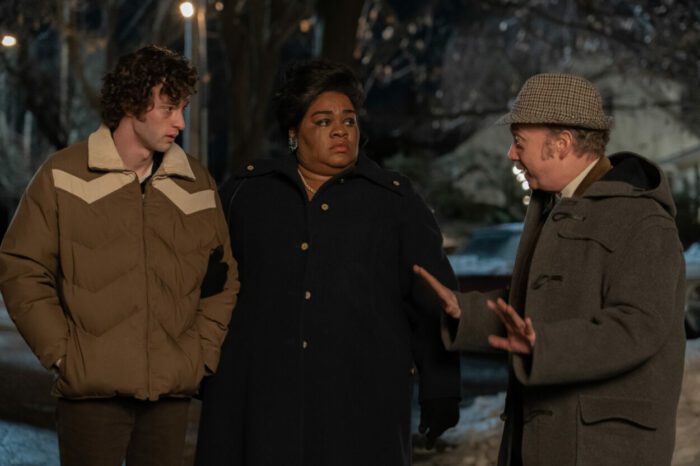
Taking place in 1970, The Holdovers is a touching and hilarious drama directed by Alexander Payne that poignantly explores themes such as love, loss, growing up, and searching for meaning. Newcomer Dominic Sessa plays Angus Tully, a troublemaking misfit with no option but to stay at his New England prep school during winter break. Tully and a few other unlucky holdovers are placed under forced supervision by a curmudgeonly history teacher, Paul Hunham (Paul Giamatti).
The school’s lonely and grieving cook, Mary Lamb (Da’Vine Joy Randolph), struggles with the death of her son and has nowhere else to go. Over these two weeks, the trio finds companionship amongst each other, learning crucial life lessons and making the most of each moment. Payne turns the dial back to his darkly comic roots with a heartwarmingly simple yet effective premise that never lacks laughs or emotional depth. Giamatti, Sessa, and Randolph equally shine as some of the best standout performances of 2023. — Lilli Keeve
Godzilla Minus One
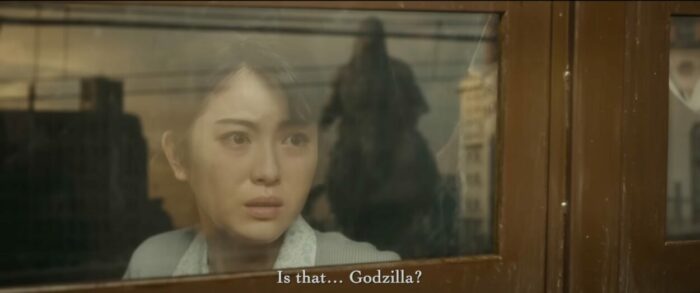
Godzilla Minus One is the sort of movie that reminds me of what the great filmmaker Samuel Fuller tells Jean-Paul Belmondo’s character in Pierrot le Fou (1965) when asked to define cinema. “Film is like a battleground,” Fuller says, “love…hate…action…violence…death. In one word: emotions.” Whether you’re a longtime Godzilla fan or have never before seen a Godzilla flick, this is a movie for people who love movies. Produced by Toho Studios, marking the 70th anniversary of the character’s first appearance onscreen, it is set in the immediate aftermath of World War II and tells the story of a disgraced kamikaze pilot who leaves his chosen family to help fend off a certain irradiated prehistoric reptile from attacking Japan. You may just stand up and cheer by the time the credits roll. — Will Scheibel
The Beasts
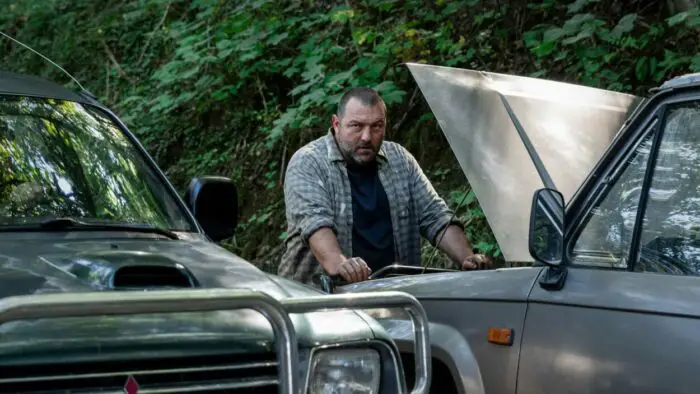
The Beasts is an eviscerating thriller about the complexities of geopolitical conflict. It also touches upon generational differences in coping with trauma, the timeless temptation of easy money as an escape from back-breaking poverty, the eternal ethical clash between philosophical principles and economic priorities, the irreconcilable follies and fallibilities of modern capitalism, and the formidable power and existential pitfalls of self-righteous obduracy.
The moral tension ramps up, scene by scene, to disquieting heights. Two extended, onscreen arguments have more moral subtlety than most 21st-century films, recalling the likes of Asghar Farhadi’s A Separation or Nuri Bilge Ceylan’s Winter Sleep. One concerns the plight of indigenous Galician farmers and their right to have a larger political claim to decisions surrounding native lands. The other involves a mother and her peremptory daughter and unveils the entitled, doting mindset of the latter. The daughter’s interpersonal overreach resembles how easily solicitude and projection can veer into self-serving psychoanalytic slander and arrogance.
The entire cast is spectacular. The cinematography is gorgeous and precise. The score ratchets up the anxiety to max levels. The metaphors and symbols hit hard (i.e., a car battery poisoning a well by infecting tomato harvest with lead and a camcorder as a futile yet meaningful defense mechanism) without ever being overbearing. The blocking is meticulous. About five or six long shots are dynamically mapped out with impeccable accuracy and dimensionality, creating palpable suspense and visceral claustrophobia without ever feeling too showy. For those who enjoy getting stuck in a moral/existential quandary, this is grade-A cinema and easily one of the best US theatrical releases to emerge in 2023. — Paul Keelan
Maestro
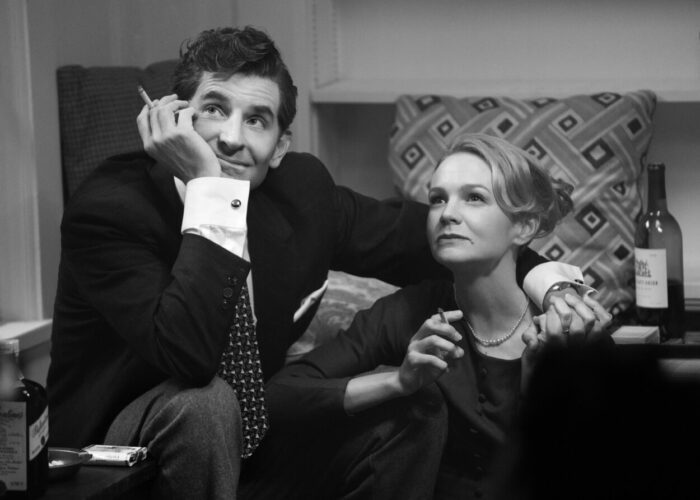
What impresses me the most about Maestro and makes it one of the best films of the year is the comprehensive commitment from Bradley Cooper in so many facets of the movie and years of research on the project. Maestro could have easily been a by-the-numbers biopic that only played the greatest hits of Leonard Bernstein’s life. Instead, Cooper and co-screenwriter Josh Singer found the core of the man through his family, his marriage to Carey Mulligan’s Felicia Montealegre (astonishing in her role), and a complicated outside love life. In doing so, the showmanship and technical prowess at Cooper’s disposal is used to accentuate dramatic moments equally as much as performance peaks.
And when those big peaks come in Maestro, it still emanates from Cooper. He’s there in heavy makeup conducting the actual London Symphony Orchestra in character after training for months to get the moves right (and on the second take during the centerpiece performance at Ely Cathedral), all while shooting and capturing the concert audio onset in the actual locations. His effort is undeniable and the blending the family stakes and the showcase of legendary talent is deftly balanced for award-worthy quality and audience appeal. Keep making movies, Bradley Cooper. —Don Shanahan
Past Lives
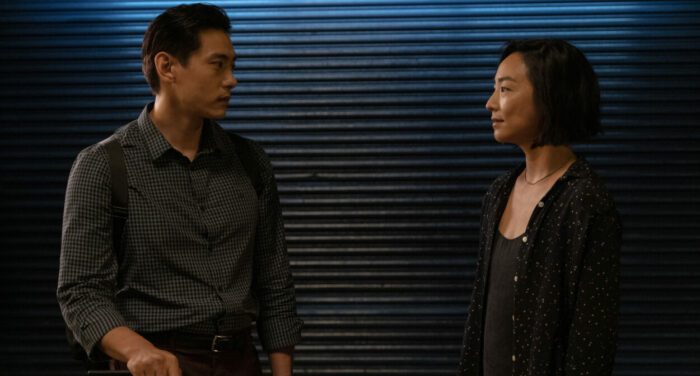
One of the best directorial debuts in recent times, Celine Song’s pitch-perfect, swoon-worthy romantic drama Past Lives is one of the finest movies of 2023. We’ve needed a heart wrenching romance since Richard Linklater’s Before trilogy and Song has made her own Before movie by combining all three installments into her first feature. As Nora (a fantastic Greta Lee) and Hae Sung (Teo Yoo) connect and reconnect with each other in the strong first two acts of the movie, it’s the third act where Past Lives becomes a masterpiece. Both characters explore the notion of fate and its role in their lives (current and previous). There is love between these two and it just so happens the life they’re in isn’t the one they end up together. That’s life, sometimes, and it hurts. Sometimes, even when you feel there’s one person destined for you, there just aren’t enough layers of inyun for you two to end up together. But, Song doesn’t leave us (completely) devastated. There might be another life where Nora and Hae Sung have the right amount of inyun. Till then, we have to play the cards we’re dealt. It’s been a long time since a movie has moved me like Past Lives did. This will always be a special movie and I can’t wait to see what Celine Song makes next. — Aqib Rasheed
Air
![[L to R] Matthew Maher as Peter Moore, Matt Damon as Sonny Vaccaro, and Jason Bateman as Rob Strasser in Air (Amazon Studios)](https://filmobsessive.com/wp-content/uploads/2023/12/1680482362_0pTFMK.jpg)
Air tells the story about Nike’s pursuit of Michael Jordan in 1984. With the Jordan brand brings in billions of dollars a year and is one of the most popular brands in the world, know how this story ultimately ends. But like all great sports movies, it isn’t how the movie ends, it’s about the journey we took to get there. From a debut screenplay by Alex Convery, Air hits classic sports movie tropes while also featuring smart, fast dialog. It’s an inspirational, rousing film about putting yourself on the line for what you believe and never giving up on yourself, even when all hope seems lost. The talented ensemble led by Matt Damon brings the script to life, along with Ben Affleck’s swift, efficient, and energetic direction. He embeds us in 1984 culture by utilizing authentic costumes, sets, and great needle drops. Much like the film’s star athlete, Air is greatness on every level. —Kevin Wozniak
May December
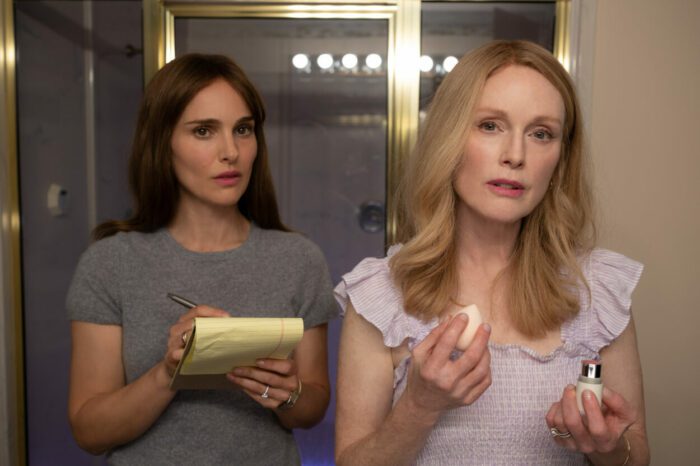
May December is one of those movies that feels like you’re a frog in a pot of water on the stove. You know the old saying: a frog placed in boiling water will jump out immediately, but if you put a frog in lukewarm water and bring it up to a boil, the frog will stay there until it dies. May December is not boiling at the start, it’s tepid. The film lures you in with Julianne Moore’s southern hospitality, Charles Melton’s gentle smile, Natalie Portman’s innocent questioning, and the lazy, hazy days of summertime. Of course, appearances are not what they seem and the water is cranking up to its inevitable boil. May December is one of those movies that crawls into your skin and makes you shiver. — Tina Kakadelis
Of an Age
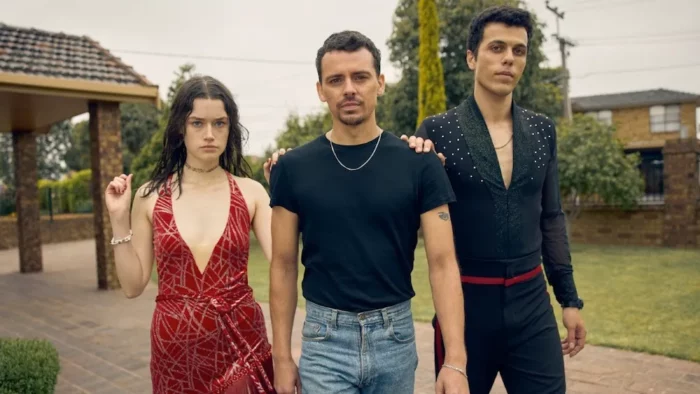
Goran Stolevski’s sophomore feature Of an Age (behind his art-horror 2022 debut, You Won’t Be Alone) is a stylish, tasteful gem of a movie, exuding incredible promise for Stolevski as a burgeoning auteur. Stolevski maintains visceral emotional intimacy with immersive camerawork, extreme close-ups, and meaningful physical choreography. The opening sequence grabs the viewer by the neck, featuring a ballroom dance rehearsal, a pay phone call, and an ensuing freak-out. The energy is instantly kinetic and histrionic—hyperactive yet lived-in and raw.
Following this prologue, the film’s first half settles into a flirty, long-distance drive to a remote seaside town. Like the title, this film appropriately captures the feeling of being a very certain age and of a very certain mentality. A vibrant sense of unbridled immature innocence commingles with a melancholic undercurrent of unspoken yearning throughout. This bittersweet mixture of emotions injects even the more mundane moments with a laconic vitality.
Part 2 of the film may be asymmetrical in runtime (it is but a 15-minute coda), but it matches what precedes it in narrative weight and impact. It begins with an interstitial shot of an exploding volcano—a clear visual allusion to Wong Kar-wai’s Happy Together, which it feels like a spiritual successor to, only set Down Under in the sun-bleached landscapes of Australia. The slow-motion eruption of molten lava is a natural metaphor for the film’s fiery romantic repression while simultaneously indicating the sudden passage of a decade. In context, the first part had entirely transpired Before Sunset/Sunrise/Midnight-style throughout a single, transient, 24-hour encounter.
This sudden and jarring leap forward adds layers of existential woe: It is poignant, painfully awkward, and libidinally simmering. It is also exquisitely shot and narratively understated, avoiding melodramatic detours at every turn. Instead of hysterics, Goran maturely lets the quiet romantic anguish of unconsummated passion seep into the textures of small interactions and peripheral gestures, quietly radiating in isolation. The resulting meditation on longing and love will leave one aching in all the right ways. — Paul Keelan
American Fiction
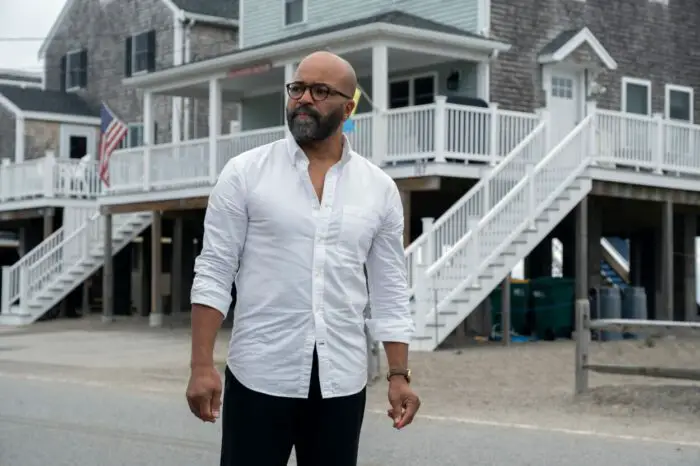
Just appearing in U.S. theaters at the end of 2024 after success at Toronto and other film festivals, American Fiction is a delightfully whip-smart media satire from writer-director Cord Jefferson, a long-awaited adaptation of Percival Everett’s novel Erasure. In adapting Everett, Jefferson gets lots right: he doesn’t tinker with the basic elements of the plot that make the novel tick, and the casting, starting with Jeffery Wright in the lead, is perfect. Wright plays Thelonius “Monk” Ellison, a writer whose work is commercially and creatively stalled as issues with his extended family multiply; meanwhile, writers whose talent is less apparent garner all the media buzz and sales numbers. In a fit of pique, Monk spews out a crude parody of black ghetto trauma he titles, bluntly, F*ck (without the apostrophe) written under the nom de plume “Stagger Leigh.”
Like Frankenstein’s, the creation takes on a life of its own as a massive success, one that provides Monk some economic stability but one that radically destabilizes his professional life. There are media demands, awards ceremonies, and film adaptations that all conspire to reveal him as the author and his book—which pretends to be an authentic first-person nonfiction memoir—as a hoax. Jefferson’s direction is expert in mining the comedy of the situation as Monk’s ruse falls apart, and the film is as funny as anything released this year. The supporting cast, especially Leslie Uggams and Sterling K. Brown, are great, and Wright anchors the film with a gravitas that makes each of his characters’ bad decisions rational. One might wish that a bit more of the venomous sting of Everett’s novel came through with the same lack of mercy it had there; if only the film had something of the panache of a Spike Lee Joint. (For that matter, for a brilliant and underseen take on the media’s fixation with black stereotypes, go see his Bamboozled.) Regardless, American Fiction is a smart and funny take on race and expectation that easily ranks among the year’s best. — J Paul Johnson
The Killer
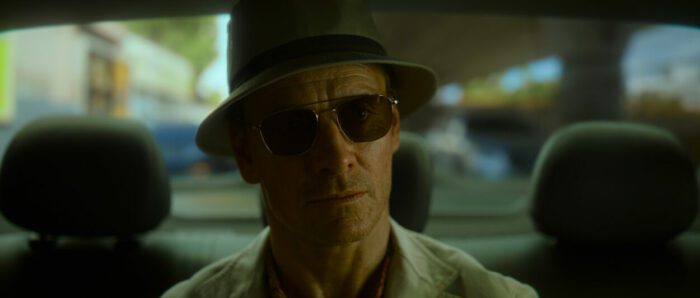
How does a perfectionist like David Fincher follow up a mixed (and incredibly incorrect) reception to Mank? By making a meta, awesome, and cool-as-f*ck thriller about a hitman who messes up an execution—pun absolutely intended. The Killer allows Fincher to return to his cold serial killer roots with a darkly comedic twist. Fight Club, The Social Network, and Gone Girl have some funny parts, but The Killer feels like the first time Fincher has committed to the bit of comedy. Whether it be Michael Fassbender’s impeccable deadpan delivery or snide jokes about consumerism, The Killer is a rollicking hoot. Even with a meta and comedic approach, Fincher doesn’t direct with frivolity or carelessness. All the themes and existential aspects that interest Fincher coalesce in the scene between Fassbender’s Killer and Tilda Swinton’s Expert, one of the best scenes of the year. It’s such a tender and ruthless scene and asks the question, “What’s the point of all of this?” The Killer doesn’t even attempt to answer that question nor do I think Fincher knows the answer. The answer may not even be the point; all that matters is how you execute. Stick to the plan. Show no empathy. If you follow all of that, you should be happy—right? — Aqib Rasheed
Barbie
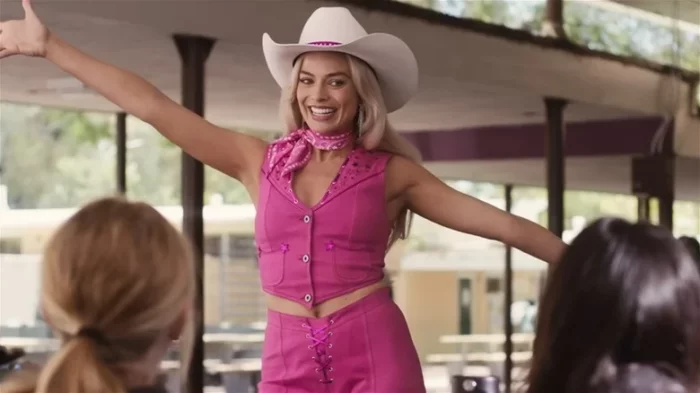
A list of the best movies of any given year always tends to have one “message movie” that captures the social pulse of the moment and put it on display for all to understand, enjoy, and join. With a doubt in my mind, that movie for 2023 is Barbie. The auteur-driven period piece entries like Oppenheimer, Killers of the Flower Moon, or The Zone of Interest can think their historical themes echo to the present, but they would be fooling themselves against Warner Bros. summer juggernaut which moved the masses like no other movie this year.
For many Barbie viewers and fans, the chief messages crescendo—not from anything done or said by Margot Robbie wondrously playing the title character—but from the proverbial regular lady of the cast with America Ferrera’s truth-speaking, tell-it-like-it-is monologue. It’s speech for the ages that crowns what already was a dazzling achievement in several production value areas from costumes and makeup to set design, practical effects, and cinematography. Barbie is the total package of art, themes, and entertainment. Don’t be surprised one bit if Greta Gerwig’s tremendous film leads the field in Oscar nominations after the calendar turns to 2024. — Don Shanahan
Anatomy of a Fall
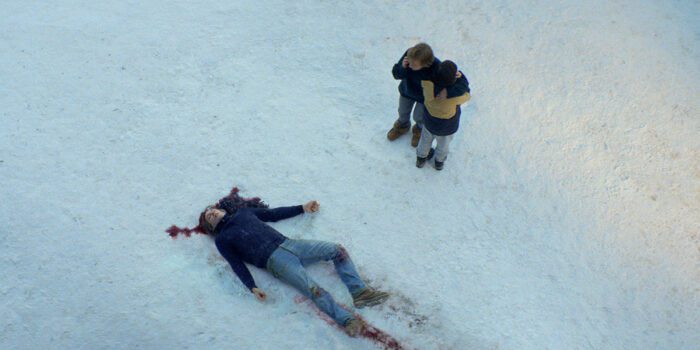
A film like Anatomy of a Fall is placed in a tough spot as its posited largely as an arthouse film, by its lengthy runtime, multilingual dialogue, literary aspirations and thematic weight. Yet despite all these things, what Anatomy of a Fall is above all is absolutely captivating from beginning to end. Courtroom dramas are hard to get wrong, they’re like sports movies or submarine thrillers, I’ve seen bad ones, but I’ve never seen a dull one, and it’s no exaggeration to say that Anatomy of a Fall might be the best courtroom drama since Judgement at Nuremberg (an equally high-minded and dialogue heavy film, which was nominated for eleven Academy Awards back in its day, and aside from the general dumbing-down of mainstream culture, I can think of no reason for Anatomy of a Fall not to match that success).
Sandra Huller gives arguably the best performance of the year, giving a multilayered character portrait of a woman under the microscope, forced to publicly account for her lowest moments and interrogate every facet of her life when she is accused of killing her husband. The trial throws every one of her achievements into question; her marriage, her career, her motherhood, and exposes her to the judgement of the court, the public, the viewing audience and her son, and the phenomenal screenplay by director Justine Triet and her partner Arthur Harari (this is an extremely incriminating film to write as a couple, like holy sh*t are you two okay?!) manages to examine the scenario from every possible relevant angle, without sacrificing an inch of depth. As the point of view slowly shifts to their son Daniel (an astonishing performance from Milo Machado Graner) we feel the real tragedy sink in as he learns the depths of the conflict between his parents. It’s a mesmerizing watch, crafted with such judicious instincts and skill, every second it knows precisely what it is trying to achieve and how best to get there, but it doesn’t feel the least bit flippant of facile with the weight and complexity of every moment building to unbearable intensities. Anatomy of a Fall is a genuine tour de force and one of the best films ever to win the Palme d’Or. — Hal Kitchen
Poor Things
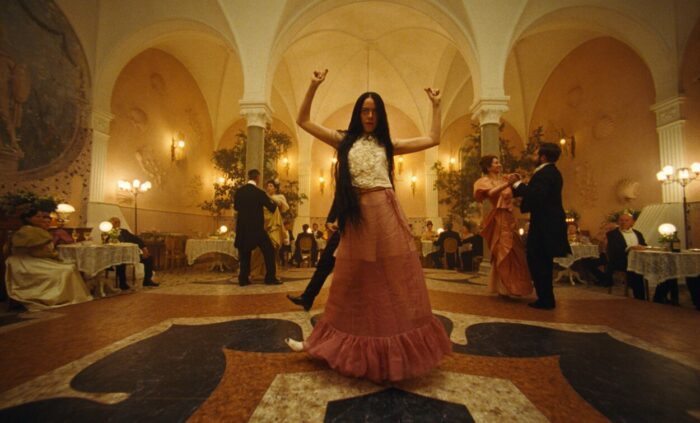
Movie sickos, rejoice! Our king, Yorgos Lanthimos, has returned to the big screen with his favorite collaborator, Emma Stone, to make his finest movie yet, Poor Things. If I had to sum up the extravagant, hilarious, and bawdy Poor Things in a few words, I would call it Barbie for sickos. Both movies are about their female protagonists finding their independence in the real world as they grow and mature throughout the movie. While Barbie opts for a candy-coated approach, Poor Things is messy, sexual, bold, and full of heart. Stone gives the defining performance of the year as Bella Baxter where she seems to be transforming and changing from frame to frame. Stone is also surrounded by one of the best supporting casts of 2023, as well. Every line Mark Ruffalo says will have you in splits to the point where you’ll miss the next dialogue simply from laughing too hard. Both Ramy Youssef and Willem Dafoe inject the movie with emotion and heart and you’ll find yourself oddly being moved in this amazingly weird movie during some of their scenes. Coupled with some of the best production design, costumes, and cinematography you will see, Poor Things is must-see cinema—there truly isn’t anything like it. — Aqib Rasheed
John Wick: Chapter Four
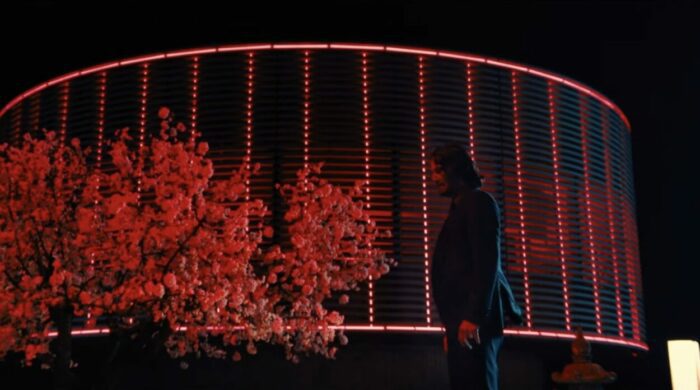
John Wick: Chapter 4 is a stunning piece of action filmmaking. A non-stop barrage of bullets, blood, and mayhem over a nearly three-hour long runtime. But what elevates it to be one of the best action movies of the decade and one of the best films of 2023 is the immaculate filmmaking throughout. This is director Chad Stahelski’s best directorial effort to date, and you see how much he has grown as a filmmaker since the first film nearly a decade ago. The action sequences are crisper and more hard-hitting. The cinematography by Dan Lausten is some of the finest work of the year. The colors, lighting, and movement during the action sequences give the film a distinct look. The editing is fast and efficient, and the set pieces are stunning. And at the center of it all is star Keanu Reeves, in the performance of a lifetime as our battered hero. Though only saying a few words throughout the film, Reeves gives a performance like that of a skilled dancer. You never feel like he is counting his steps trying to hit his spot. He flows naturally through each scene and makes them feel natural. It is an amazing piece of physical acting. —Kevin Wozniak
Kokomo City

My favorite kind of documentary is one that feels intimate without being exploitative. Kokomo City is exactly that. The film follows four trans women who are sex workers who let the audience fully into their minds, homes, and lives. We meet Daniella Carter, Koko Da Doll, Liyah Mitchell, and Dominique Silver who live in either New York or Atlanta and, by the end, they feel like friends of ours. Kokomo City is essential viewing because it gives these women the chance to tell their stories in their own words. That sort of freedom is rarely given to people of marginalized communities. You don’t realize the power that lies in being able to control the narrative of our own story until that opportunity doesn’t exist. Kokomo City is bold in black and white, a visual expression of how we often view people’s lives. We are not all good or bad, black or white. We all live somewhere in between. — Tina Kakadelis
Monster

Monster was my pick for the best film of 2023 at the midyear, and six months later it has lost none of its sympathetic power. Hirokazu Koreeda’s films have long told of the ways in which actions that seems inexplicably irrational at first, become the most natural and human things imaginable once you really see things from the character’s own perspective. Monster may be the most direct expression of this theme one could make, telling the same series of events from three different perspectives, resulting in an entirely different story each time: a horror-inflected mystery, a tightly wound social realist drama, and ultimately a heartbreaking coming of age romance. It’s simultaneously a masterpiece of story construction, Koreeda’s most audacious work as a director and a final exquisite gift from the late composer Ryuchi Sakamoto, who provides the film with its sublimely beautiful score. — Hal Kitchen
Oppenheimer
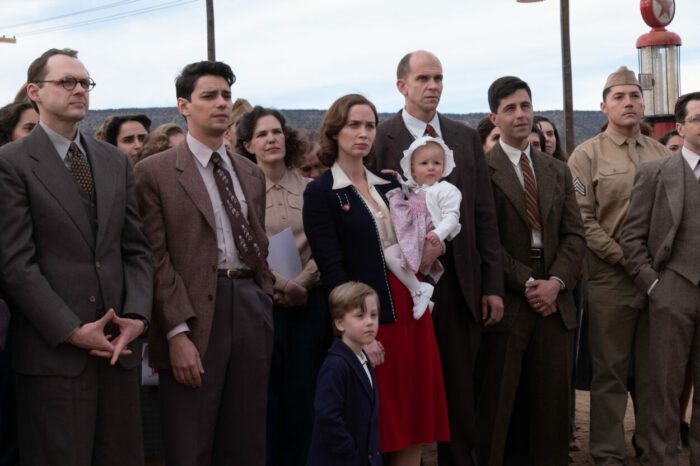
How did a three-hour biopic about the man who created the atomic bomb become one of the most successful and best movies of 2023? Only a master like Christopher Nolan could pull off a feat like that.
Oppenheimer is Nolan’s first biopic, and it is a biopic that only Nolan could make. It features a plot that features multiple timelines and multiple perspectives. It is filmed on the biggest scale possible even though most of the movie is about characters having conversations with each other in rooms. It is a technical marvel on every level, with top-notch cinematography, editing, costumes, visual effects, and the best score of the year, and features arguably the best ensemble of the year, led by career-best Cillian Murphy and a slew of great supporting performances from the likes of Emily Blunt, Josh Hartnett, David Krumholtz, Jason Clarke, and an unbelievable Robert Downey Jr.
Oppenheimer is a towering film and could go down as the crowning achievement of Nolan’s career. It is one of the finest films of the 2020s and, in the writer’s opinion, the best movie of 2023. — Kevin Wozniak
The Iron Claw
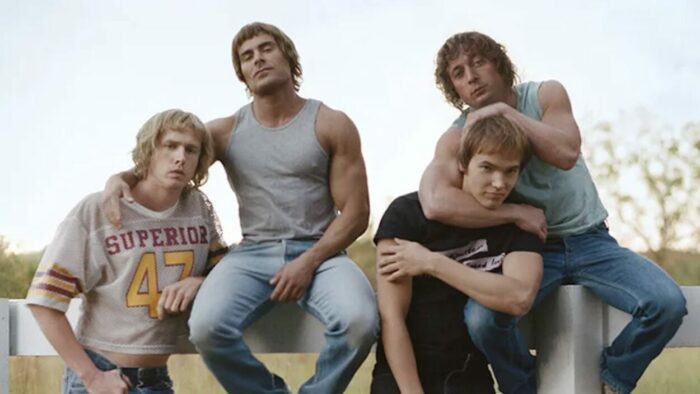
The power of the approach of The Iron Claw is two-fold across potential audiences. There will be those old school “rasslin’” fans who know the deeply tragic Von Erich family story and those that will have no idea. Viewers that know will watch with bated breath clenching for absorbing tragedy that exceeds the likes of the Greeks or Shakespeare. They’ll be rocked because it’s impossible not to, if you know the story. That effect is multiplied even greater for the majority that will come to this uninformed. They will ride right next to the veterans like tag team partners, only they’ll be sharing a tissue box instead of a championship belt.
Writer-director Sean Durkin did something special in The Iron Claw to keep the family aspect of this movie strong even against its negative portrayals on toughness and pushing oneself for success. His goal was not to make tragedy porn and not to be all sweaty sports spectacle either. Brotherhood is what stands tall, thanks to excellent camaraderie shared by Zac Efron (a career-best role), newcomer Harris Dickinson, and current breakout Jeremy Allen White. Their togetherness is the glue of the movie when everything possible falls apart. — Don Shanahan
Afire
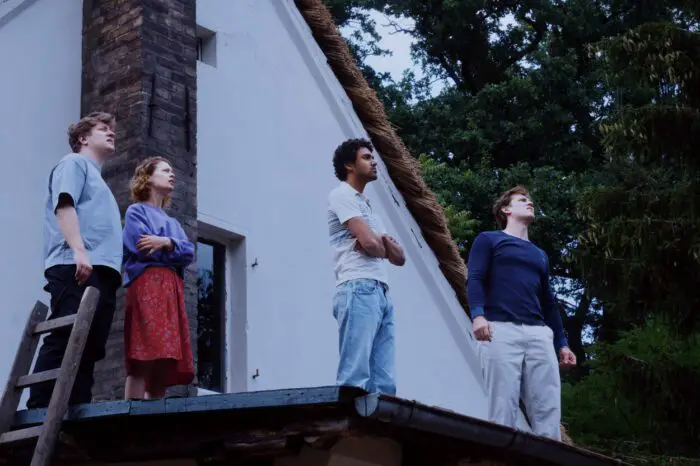
The second film in a planned trilogy from Christian Petzold begun in 2020 with Undine, Afire (Roter Himmel) feels so of-the-moment for 2023 it’s almost impossible to believe it was conceived pre-Covid. Could a film possibly be so prescient as to predict, with uncanny aim, the twin effects of post-pandemic alienation and the ravaging of the planet in runaway fires, years before either became rampant?
Afire, winner of the Golden Bear at Berlinale, is a smart study of characters who can’t quite connect. Leon (Thomas Schubert) and his friend Felix (Langston Uibel) spend the summer together in a holiday home on the Baltic coast where they plan to work—Leon on his second book, Felix on his art portfolio. Nadja (Paula Beer of Undine) and Devid (Enno Trebs) are there as well, and the pleasures of summer soon intervene. There’s more to do than work. The personal interactions and casual affairs weigh on the writer Leon, whose interpersonal anxieties look more than a little like they reside on a spectrum of autism. Frustrated by his unfinished manuscript, Leon can’t enjoy the simple pleasures of good company, his churlish mood seeming to trigger whenever the others are enjoying themselves.
On the horizon all the while is a forest fire, blazing in ash, slowly spreading across the countryside, just as they did in North America and Europe all summer: Petzold’s script’s apocalyptic visions present a world succumbing to a fiery inferno certain to claim at least some of the principals. And yet, there’s more to Afire than a world ablaze. It perfectly balances our human need for companionship with our difficulties managing even simple communication. Part thriller, part farce, part love story, part arthouse experiment, Afire is sure to delight, enthrall, and provoke its viewers with its clever script, canny performances, and superb cinematography. — J Paul Johnson




